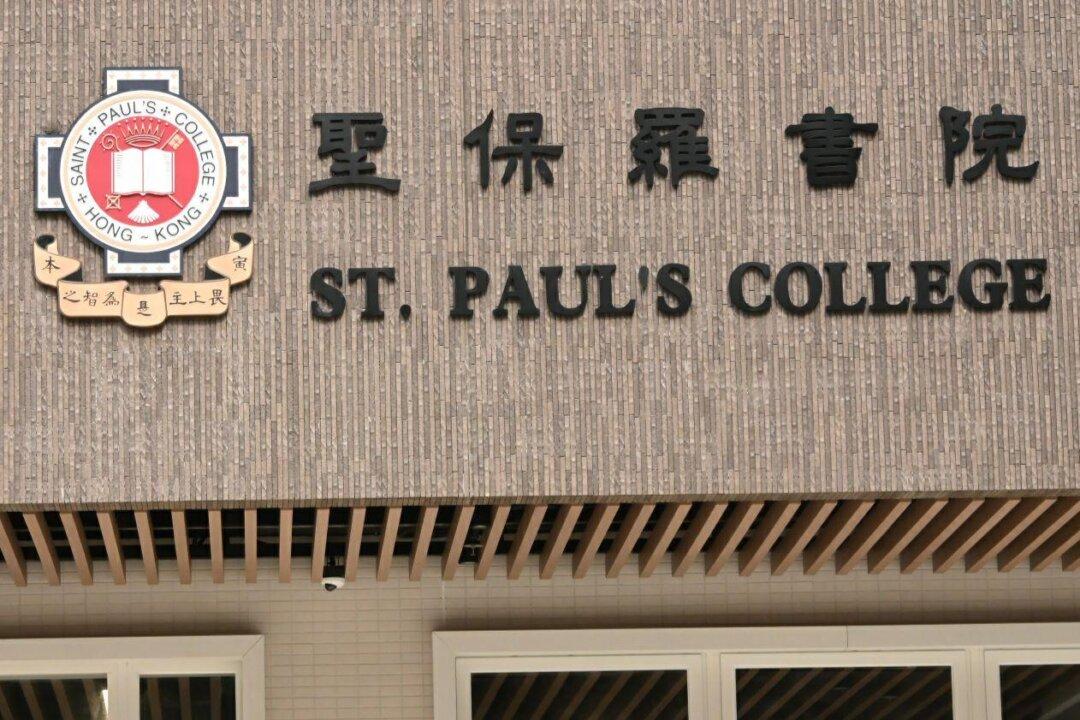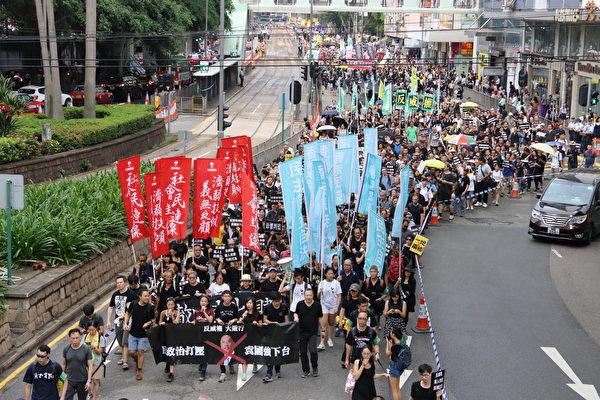The Chinese regime has been trying to suppress Hong Kong’s student-led pro-democracy movement using many of the same scare tactics the regime has always used to control mainland Chinese citizens.
After the students leading the Umbrella Movement democracy protests were denied a chance to speak with the Hong Kong government, the Chinese Communist Party (CCP) used disgraceful tactics to suppress them. These include utilizing masked men to attack the Hong Kong Legislative building and spreading rumors that foreign forces are involved in the movement.
MORE: Hong Kong Police Clear Defiant Democracy Protesters
In addition, members of the Scholarism student activist group and the Hong Kong Federation of Students have recently been denied entry to mainland China. According to some media, there are 500 names on the Party’s blacklist, but others estimate that the real number is much larger.
During the past eight weeks of protests, the CCP has used force and duress against demonstrating students and civilians to induce them to give up their principles. In other words, the regime is attempting to implant the “Party culture” of indoctrination and brainwashing into Hong Kong.
Students Barred from China
On Nov. 23, 19-year-old Scholarism volunteer Wong Chee-yan, assistant of Civic Party Legislator Kwok Ka-ki, was prevented from entering mainland China.
Wong was going to attend a relative’s wedding in the city of Shenzhen near Hong Kong. She was stopped by mainland border police, searched, and investigated for 45 minutes in a private room.
Later she was informed that she had participated in activities that breached national security and would be forbidden from entering China for a short time.
Wong said the authorities’ act was absurd.
“Such a big country, yet they’re afraid of a student; they’re badly frightened. This proves that the civil disobedience is effective,” Wong said.
MORE: Free Hong Kong: The Thirst for Democracy
On Nov. 22, student Wong Ding-wah from Scholarism and a student surnamed Kwong from Baptist University were also denied entry to China.
When Wong Ding-wah went to visit relatives in mainland China, he was stopped at a border control point and brought into a room for investigation. Later, when the border control officer returned his ID and travel document to him, he was warned not to enter China during this time.
Kwong was stopped at another border control point on his way to pay respect to his ancestors in China. The border control officer said he was not allowed to enter China for national security reasons.
When Kwong questioned him further, the officer replied, “You know the reason.”
The convener of Scholarism, Joshua Wong Chi-fung, issued an announcement asking CCP authorities to account for the incidents. He wondered whether Hong Kong police have handed the Umbrella Movement name list to the CCP.
Party Culture
Putting dissidents on a blacklist, barring them from entering China, and invalidating their permits to get into China are tactics the CCP regularly uses to suppress those who oppose it.
Now the CCP has applied the same methods to the Umbrella Movement demonstrators, including even the non-core members. This shows that the CCP’s blacklist covers a wide range.
The CCP is purposely creating fear in Hong Kong by suppressing some of the dissidents in order to frighten all the rest. Step by step, the CCP would do the same to every Hongkonger who opposes it.
The CCP threatens people to force them to give up their moral principles and comply with the CCP. This is a typical Communist ideological transformation method.
The Party is trying to implant the idea into Hong Kong that when you oppose the CCP, your interests will suffer. When you participate in the Umbrella Movement, you will never be allowed to enter China. The aim is to force people to give up on justice, righteousness, and conscience, to lose their identity, and just drift along.
Economic Threats
Francis Lui Ting-ming, a member of the Anti-Occupy Central Alliance that opposes the protests and a professor at the Hong Kong University of Science and Technology, warned that the Umbrella Movement could delay universal suffrage in Hong Kong for another 10 years. Lui added that Beijing might not support Hong Kong economically anymore.
University of Hong Kong economics Professor Richard Wong Yue Chim said the Umbrella Movement would make Hong Kong an unreliable partner, and the mainland would not be willing to try new policies there, affecting Hong Kong’s long-term development.
Democratic Party legislator Albert Ho considers Lui’s speech consistent with the CCP’s threatening tactics.
“Hongkongers must be confident,” Ho said. “Do not get intimidated by it.”
MORE: China’s Military Spies on Hong Kong From Mountain Base
Another Democratic Party legislator, Sin Chung-kai, agreed and said these kinds of threatening remarks have happened before. For example, he said the Shanghai-Hong Kong Stock Connect was just launched in Hong Kong, although beforehand the officials kept saying it would be postponed due to the Umbrella Movement.
Legislator Gary Fan Kwok-wai from the Neo Democrats said Lui’s remarks distorted the facts.
“The reason for the Umbrella Movement was that the SAR government and Beijing delayed the timeline for implementing true universal suffrage in Hong Kong. Now they’re putting the blame on the protesters, which is just blaming the victims,” Fan said.
As to whether Lui’s speech would affect Hong Kong’s economic policies, Fan called Lui’s remarks “servile” and said the CCP uses this method to create a “united front” under the Party dictatorship.
Fan said the economic benefits are a soft means to win over the people, while the economic pressure is a hard means to threaten people and force Hongkongers into submission.
“We know a lot of economic policies were made based on political considerations, or using economic means to solve political problems,” Fan said.
In fact, the CCP has always tempted Hong Kong people with benefits and created terror to threaten them into giving up on the core values of Hong Kong: human rights, rule of law, freedom of press, and the traditional Chinese beliefs in doing good deeds and being virtuous.
Written in English by Sally Appert. Translation by Michelle Tsun.




